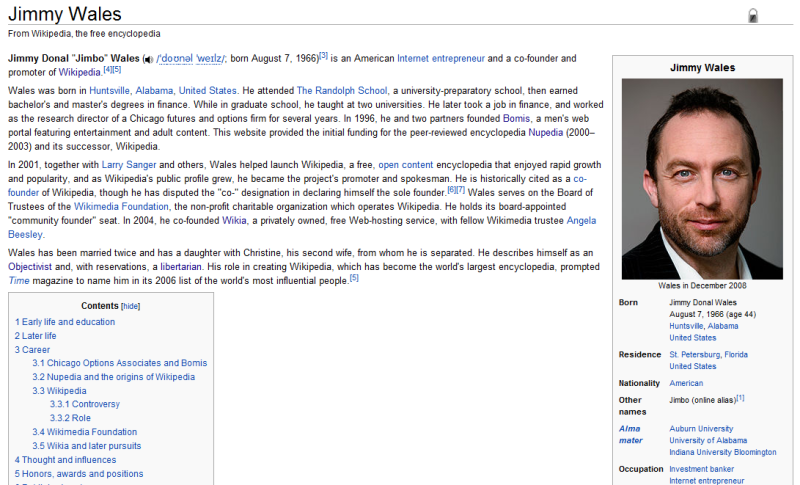Jimmy Wales looks exactly like his picture. Any of Wikipedia’s 400 million readers would recognise the site’s founder as he sits across a coffee table from Pocket-lint on a wet afternoon in a ground floor office space in East London. There’s the same black polo neck, the same tawny beard and same distinguished hairline atop what he’s referred to in the past as an “ugly mug” to help pull in the donations in the most recent round of site funding. The only difference is that he’s got the reddest eyes we’ve ever seen.
They’re supposed to be blue. We looked on Google Images just to check, but today it’s as if all of his blood vessels have come to the surface to celebrate Wikipedia’s 10th birthday and greet the endless string of engagements planned for his seemingly round the clock tour. He hasn’t just stepped off a trans-Atlantic flight. He’s been in the country for four days now, but it’s quickly clear from speaking to him that “Jimmy Wales” should be under his own site’s entry for “workaholic”.
It’s 3.30pm and it dawns on the man behind the world’s first and largest free online encyclopedia that he hasn’t actually stopped to eat anything all day. On Pocket-lint’s suggestion, he politely asks his PR manager - his only other travelling companion apart from a laptop and an HTC Desire Z - if she’d grab him some sushi from next door and we promise not to keep him too long. It’s just a shame we had our fingers crossed.
“I was always very optimistic”, says the 44-year-old as he takes us back to how it all started. “I really believed the whole thing would work. Even from the beginning. In the first few years we were doubling our editors and our traffic each 3 or 4 months. We were too busy to be sitting round surprised at what was going on. We were just trying to keep everything running. I always say, though, I’m just pathologically optimistic. I always think things will go great”.
Wikipedia was the first real example of a successful crowd-sourced internet project when it opened its servers 10 years ago in 2001, with a mission to provide a free online encyclopaedia for every single person on the planet in their language - something, it seems, very much inspired by Wales's early life. Educated in his mother's one-room schoolhouse in Huntsville, Alabama, up until 13, he credits the Montessori teaching method with his early childhood intellectual curiosity and prophetic habit of spending hours leafing through sets of encyclopaedia, but it wasn't as simple a step from one to the other as it might seem.
It was only in 1996, after starting out in the financial world, that Wales embarked on his life as a internet entrepreneur. Fascinated with all things online and with an eye for opportunity, he co-founded a site described as a "guy-orientated search engine" called Bomis - the idea being to make money from display advertising sat next to a gateway to soft porn. The project never quite hit the big time but did make enough to start venture number two - a familiar sounding site called Nupedia. It was a free encyclopaedia, but with whole entries written by experts with an excruciating and laborious submission process to suffer before each could be published. Finally, it was in 2001 when the idea struck Wales and co-founder Larry Sanger to take up the wiki structure, and the crowd sourced version as we know it today was born.
“We were Web 2.0 before Web 2.0”, as Wales puts it, but the method by which the content is created is a term against which he pushes back.
“I don’t think ‘crowd-sourcing’ is a very good description. The word comes from outsourcing - from cheap off-shore labour; even cheaper, get the public to do it for free - and it disrespects and misunderstands what people are doing. It’s not crowd in the same way as voting things up and down on Digg where hundreds of people contribute one click to a flow of information. In general, on a Wikipedia tree, it’s very small group collaboration as opposed to crowds.
“When I’m editing articles with people on the House of Lords (a subject area where Wales has become something of an expert) there are six to eight of us that I run into all the time who know the standards and conventions of what we’re trying to do but it’s not really the crowd. It’s not like hundreds of people turn up and magically this stuff appears”.
Wales’s preferred name for the mechanism by which the content comes to fruition is “peer production”, but whatever the public and press choose to call it, one of the great criticisms of the past for Wikipedia has always been the question of reliability. It’s the very flipside of the unique way that it’s put together. If anyone can edit it, then how can it be trusted?
The reality, as Wales explains, is the huge number of checks and balances that lie within the system. Every edit requires a reference to the fact and each of the changes has an eye cast over it by other Wikipedians in the community but, of course, that doesn’t mean that mistakes don’t happen. You only need to click on the “View History” tab on any of the pages to see hundreds of revisions of errors as well as acts of vandalism quickly snuffed out.
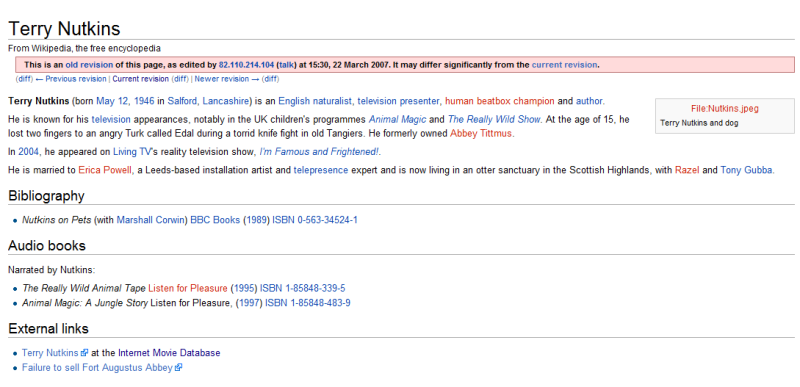
An old version of Terry Nutkins’ page falsely claims that the 80s TV naturalist “lost two fingers to an angry Turk called Edal during a torrid knife fight in old Tangiers” and that “he formerly owned Abbey Tittmus”.
His sushi arrives and Wales hunches his broad frame over the small, plastic box with barely the strength or starved dexterity to break into the tiny condiment sachets. His eyes roll back as the first mouthfuls of rice fizz inside his stomach.
“Years ago there was a news fad for eBay that someone was selling their soul or their baby or their baby's soul”, he manages to get out through and between dense portions of nigiri.
“These days, those auctions are flagged immediately, which, in fact, they probably always were but the fad of reporting them has gone away. You can write anything on eBay but they take it down straight away, and so what?
“It’s the same thing with Wikipedia. I remember when Anna Nicole Smith died, someone came onto the Wikipedia page, vandalised it and wrote some nasty things about her - deleted the whole entry and replaced it with ‘Anna Nicole Smith was a bitch’. It was reverted back virtually instantaneously and then I got eight calls from the media about this. And one reporter said to me ‘does this prove that there’s a flaw in the Wikipedia model’ and I said, ‘actually, I think this proves that there's a flaw in the news reporting today. If Anna Nicole Smith dies and I get eight calls about it. There’s actual news going on in the world that you could be reporting rather than talking about Wikipedia’."
“That fad has passed. If there’s vandalism now, I don’t hear about it. It’s usually checked very quickly and I think we’ve got better than that. If it does get reported on, these days we just roll our eyes and say ‘so what, it got fixed in a minute’.”
We allow the poor guy a moment to catch his breath as washes down the remains of his stodgy snack with a bottle of coke. It certainly feels as if the site has graduated to a trusted source in people’s eyes some time in the last few years but, according to Wales, it’s still worth having reservations.
“Even today I think people should be very careful with Wikipedia. Although the quality continues to increase, people should be cautious, but I also think that people should be cautious with the newspapers and all sources. There are errors in everything and even very high quality materials are full of them. That’s just because it’s really, really hard to get things right”.
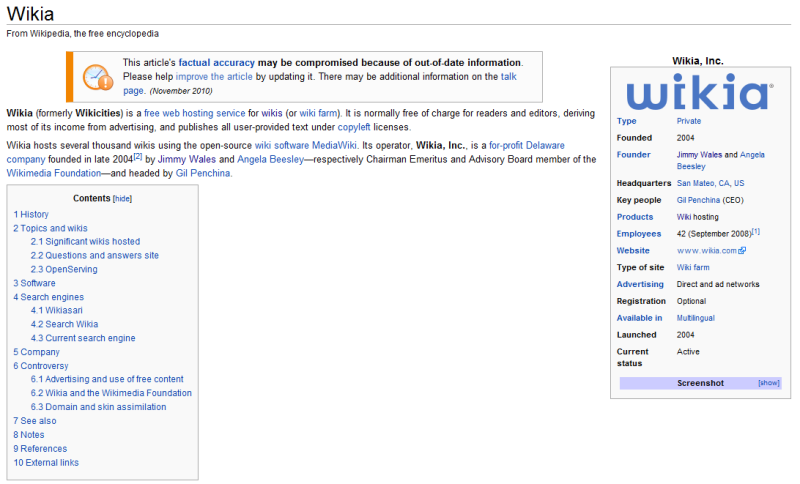
Wales himself still edits the pages on a nearly daily basis in much the same way as the other 80,000 Wikipedians out there, but he admits that the site is far from perfect. Looking to increase its user base from 400 million to 1 billion in the next 4 years, one of the key areas identified to target is getting not just more but a wider range of editors contributing to the articles.
“It’s about diversifying the community. At the moment we’re really male, geek-orientated, which is great, but there are lots of editors that we don’t get who are geeks, but not tech geeks. So they may be real experts in, say, ancient Chinese poetry but if they go to try to edit Wikipedia, then they find it too intimidating and we lose them and that’s just silly. We shouldn’t just lose people because the technology is hard. That’s what we’re trying to do something about at the moment”.
Start yourself a profile as a Wikipedian and you quickly see what he’s talking about. The behind the scenes pages are a soup of code on first glance and a taxing enough flash to put off even the tech savvy. In response, the non-profit organisation has already introduced a subtle re-skin and revamped the previously complex system for uploading media. The big change will come, more than likely, when Wikipedia incorporates the open source WYSIWYG editor tools as created by Wales’s commercial venture Wikia - a site that allows communities to create, edit and publish wikis of their own.
“In English Wikpedia, it’s not so much that we’re missing any subject areas, we’re just not as strong in them. If you look at areas tech geeks are interested in, it’s incredibly thorough. If you move outside that, we have stuff - it’s not like nobody comes and edits on those areas - but we’re not as strong as we could be, for example, with anything in the humanities.
“So, if you look up Picasso, we have a fabulous article because he’s obvious enough and famous enough. There’s loads of people who would write about that. But if you step out to second or third tier for artists of historical importance, it can be very weak - maybe just have two paragraphs really. There could be more, it’s just that no one’s got round to doing it. We just don’t have that many people who are interested in the history of art. Those are the kinds of areas we feel like eliminating some of the tech barriers will allow the art geeks to come in and do stuff”.
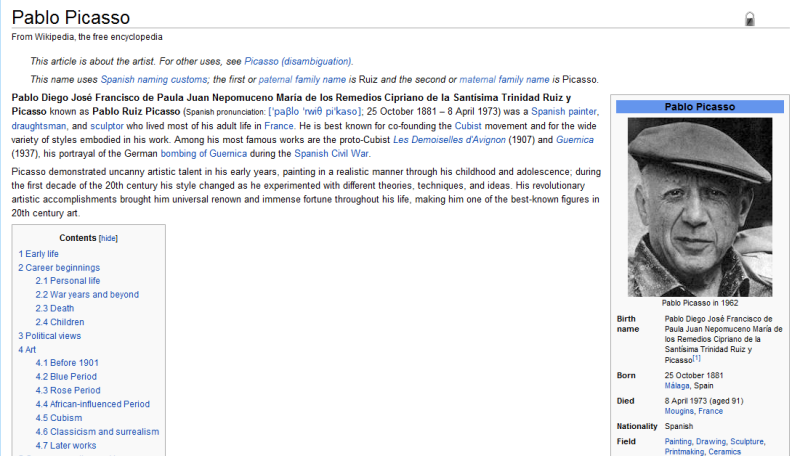
A second prong of attack in the same field is the idea of Wikipedia’s GLAM initiative - Galleries, Libraries And Museums. The idea is to encourage academics, specialists and experts from the arts to start editing by showing them how it’s done and lead them by hand into the community. Not only would they bring the missing depth Wales craves but perhaps also the multimedia riches in the shape of a better image library. With 3,000 pictures removed on request of the National Portrait Gallery a few years back, Wikipedia could certainly do with building a few bridges here.
“We always want to invite good authors. A lot of museums have come to understand that it’s really valuable to them as an institution serving the public - both from a business model perspective but also a mission perspective - to make sure that their collection is well covered in Wikipedia.
“If your role in society is to bring culture to people - which is what they’re for - it’s a great way to do that but it also helps to build up the visitor base. People go to a Picasso exhibition because they know who he is. If all you have in your museum is stuff nobody’s heard of because it’s not in Wikipedia, that’s a bad thing. So we think there’s good reason for museums to work with us”.
The program has already had some success in the UK with the British Museum taking in a Wikipedian in residence who went into the Bloomsbury institution on a daily basis for 2 months showing academics and experts the peer production community ropes. A quick glance at its page in the online encyclopaedia now boasts a pretty impressive entry peppered with high quality pictures and details of the building’s exhibits, floor plan and enough links to send you down a Wikipedia trail that could last an afternoon - something to which the site’s founder still finds himself prone.
“I absolutely still get lost in Wikipedia. There’s that great cartoon ‘the problem with Wikipedia’ where someone starts reading a legitimate topic and ends up reading about the Brady bunch. Just like anybody, who knows where I might end up”.
His eyes turn to the stars when we ask him which his favourite entry on the site is and there’s a sparkle about him as he scratches his beard and for a few seconds the thought of his schedule drops from his shoulders.
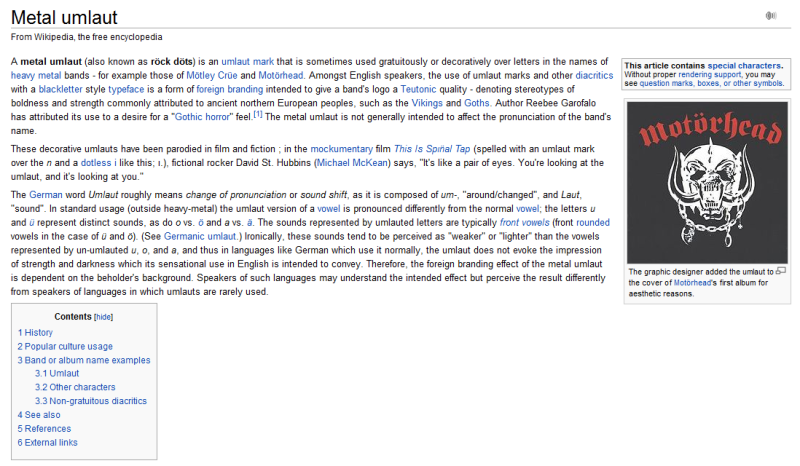
“Well I have a few that I find quite entertaining. One is the page on heavy metal umlaut - renamed to Metal Umlaut - based on bands with umlauts over letters in their name and often in places that don’t make any sense in German. My favourite is Spinal Tap where the umlaut is over the n. There’s a really great time lapse video somebody made showing that part of the article where the community tried to figure out how to represent it because there is no letter in German with the an umlaut over the n, so it doesn’t appear in the font.
“For a while someone made an image. It was okay but it’s not Googleable and it didn’t look quite right but eventually someone found in, I think it was Old Icelandic, that there was a character represented with an n and an umlaut, so someone could then find it in Unicode and change it. So now it works. It’s fairly obscure but a really interesting article”.
Of course a collection of interesting articles on the scale of Wikipedia needs money to fund it and it’s obvious that the annual round of raising cash isn’t Wales’s favourite time of the year. So, does that mean that he would ever consider saving the time and energy by resorting to an on-site display advertising system instead?
“We’ve never said absolutely not. We don’t want to have advertising in Wikipedia. We don’t think we need to have advertising on Wikipedia. But we would do whatever is needed for survival. I have said that consistently since day one that we’re not going to shut it down for the want of sticking up a Google ad”.
While a commercial model would be considered, the chances of any user ever having to pay to look at the site’s pages are next to nil. Wales's views on pay walls are little short of contemptuous.
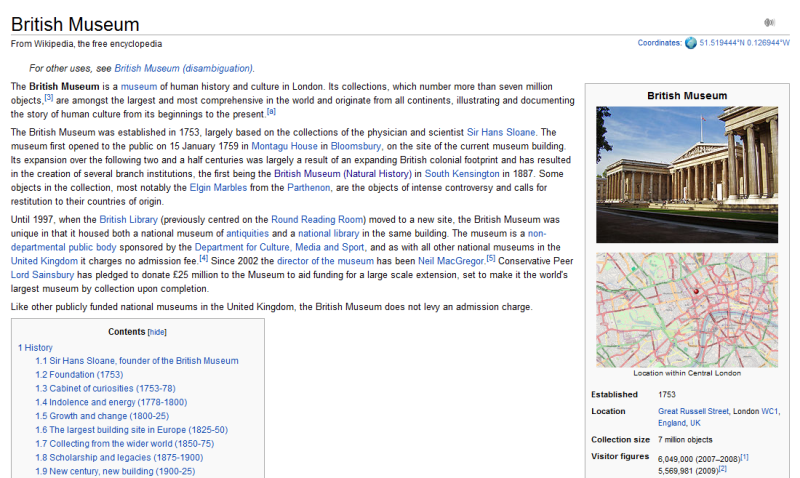
“I think people think there’s a trend towards pay walls when there isn’t. We go through this fad every few years. It’s only ever one or two newspapers who try for a while and then give up. I haven’t seen anything substantial to think there’s a trend afoot here. I could be convinced if shown statistics but I don’t think that’s going on. I think we’ve seen The Times of London and that was big enough to get people thinking about following suit but, mark my words, the Times of London will give up on that idea”.
Even if he thought the system would work, it runs against the very core of Wikipedia and the reason Wales started the project in the first place - a free encyclopaedia for every single person on the planet in their language - a big picture vision which he believes harks back to the origins and values of the internet and the heart of why this is a crowd sourcing system that has worked so very well and what made the community click.
“I remember when I had the idea. I was absolutely transfixed with it. It’s a worth while goal and it has the potential to be transformative of the world. I like things that are interesting and worth doing and it always felt to me that I could have a legitimate impact and do something useful with my time. So, here I am”.
Having done our best to keep it brief, a quick glance at the clock and a bit of maths tells us we’ve managed to total up 45 minutes of questioning and his liaison is getting twitchy. A young man in a Wikipedia t-shirt walks right past the sofas as we pack up to go without so much of a flicker of the irony. It seems that despite the banners on top of the site throughout December, not quite everyone recognises who Jimmy Wales is. Which reminds us. It’s been so busy at Pocket-lint that we never get round to offering up our donation. We hand over our five pounds to Mr Wales and wish him a pleasant stay. Some sleep would probably go down well too.


